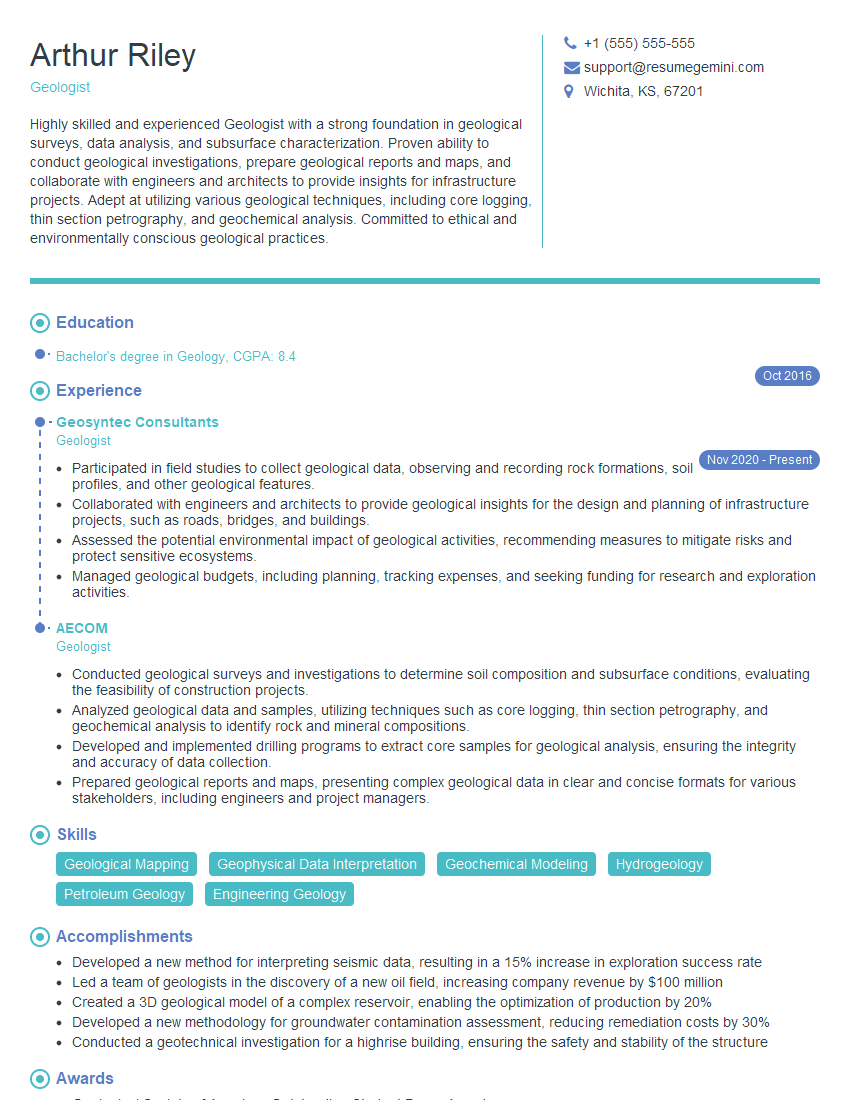Are you a seasoned Geologist seeking a new career path? Discover our professionally built Geologist Resume Template. This time-saving tool provides a solid foundation for your job search. Simply click “Edit Resume” to customize it with your unique experiences and achievements. Customize fonts and colors to match your personal style and increase your chances of landing your dream job. Explore more Resume Templates for additional options.

Arthur Riley
Geologist
Summary
Highly skilled and experienced Geologist with a strong foundation in geological surveys, data analysis, and subsurface characterization. Proven ability to conduct geological investigations, prepare geological reports and maps, and collaborate with engineers and architects to provide insights for infrastructure projects. Adept at utilizing various geological techniques, including core logging, thin section petrography, and geochemical analysis. Committed to ethical and environmentally conscious geological practices.
Education
Bachelor’s degree in Geology
October 2016
Skills
- Geological Mapping
- Geophysical Data Interpretation
- Geochemical Modeling
- Hydrogeology
- Petroleum Geology
- Engineering Geology
Work Experience
Geologist
- Participated in field studies to collect geological data, observing and recording rock formations, soil profiles, and other geological features.
- Collaborated with engineers and architects to provide geological insights for the design and planning of infrastructure projects, such as roads, bridges, and buildings.
- Assessed the potential environmental impact of geological activities, recommending measures to mitigate risks and protect sensitive ecosystems.
- Managed geological budgets, including planning, tracking expenses, and seeking funding for research and exploration activities.
Geologist
- Conducted geological surveys and investigations to determine soil composition and subsurface conditions, evaluating the feasibility of construction projects.
- Analyzed geological data and samples, utilizing techniques such as core logging, thin section petrography, and geochemical analysis to identify rock and mineral compositions.
- Developed and implemented drilling programs to extract core samples for geological analysis, ensuring the integrity and accuracy of data collection.
- Prepared geological reports and maps, presenting complex geological data in clear and concise formats for various stakeholders, including engineers and project managers.
Accomplishments
- Developed a new method for interpreting seismic data, resulting in a 15% increase in exploration success rate
- Led a team of geologists in the discovery of a new oil field, increasing company revenue by $100 million
- Created a 3D geological model of a complex reservoir, enabling the optimization of production by 20%
- Developed a new methodology for groundwater contamination assessment, reducing remediation costs by 30%
- Conducted a geotechnical investigation for a highrise building, ensuring the safety and stability of the structure
Awards
- Geological Society of Americas Outstanding Student Paper Award
- American Association of Petroleum Geologists Best Paper Award
- Society of Exploration Geophysicists Best Poster Award
- National Science Foundations Graduate Research Fellowship
Certificates
- Professional Geologist (PG)
- Certified Engineering Geologist (CEG)
- Certified Hydrogeologist (CHG)
- Certified Petroleum Geologist (CPG)
Career Expert Tips:
- Select the ideal resume template to showcase your professional experience effectively.
- Master the art of resume writing to highlight your unique qualifications and achievements.
- Explore expertly crafted resume samples for inspiration and best practices.
- Build your best resume for free this new year with ResumeGemini. Enjoy exclusive discounts on ATS optimized resume templates.
How To Write Resume For Geologist
- Quantify your accomplishments with specific metrics whenever possible.
- Highlight your expertise in specific geological techniques and software.
- Demonstrate your ability to work effectively in a team environment.
- Emphasize your commitment to ethical and environmentally responsible practices.
- Proofread your resume carefully for any errors.
Essential Experience Highlights for a Strong Geologist Resume
- Conducted geological surveys and investigations to determine soil composition and subsurface conditions, evaluating the feasibility of construction projects.
- Analyzed geological data and samples, utilizing techniques such as core logging, thin section petrography, and geochemical analysis to identify rock and mineral compositions.
- Developed and implemented drilling programs to extract core samples for geological analysis, ensuring the integrity and accuracy of data collection.
- Prepared geological reports and maps, presenting complex geological data in clear and concise formats for various stakeholders, including engineers and project managers.
- Participated in field studies to collect geological data, observing and recording rock formations, soil profiles, and other geological features.
- Assessed the potential environmental impact of geological activities, recommending measures to mitigate risks and protect sensitive ecosystems.
- Managed geological budgets, including planning, tracking expenses, and seeking funding for research and exploration activities.
Frequently Asked Questions (FAQ’s) For Geologist
What is the role of a Geologist?
Geologists study the Earth’s composition, structure, and history. They use their knowledge to locate and extract natural resources, such as oil, gas, and minerals. They also assess the environmental impact of human activities, such as mining and construction.
What are the educational requirements to become a Geologist?
Most geologists have a bachelor’s degree in geology or a related field, such as environmental science or geophysics. Some geologists also have a master’s degree or doctorate.
What are the job prospects for Geologists?
The job outlook for geologists is expected to be good over the next few years. As the world’s population grows, there will be an increasing demand for natural resources. Geologists will be needed to help locate and extract these resources.
What are the key skills for a Geologist?
Geologists need to have strong analytical and problem-solving skills. They also need to be able to work independently and as part of a team. Geologists should also have good communication skills, as they often need to explain complex technical information to non-specialists.
What is the average salary for a Geologist?
The average salary for a geologist is around $90,000 per year. However, salaries can vary depending on experience, education, and location.
What are the different types of Geologists?
There are many different types of geologists, including petroleum geologists, environmental geologists, and engineering geologists. Petroleum geologists work in the oil and gas industry, while environmental geologists work to protect the environment. Engineering geologists work with engineers to design and construct safe and stable structures.